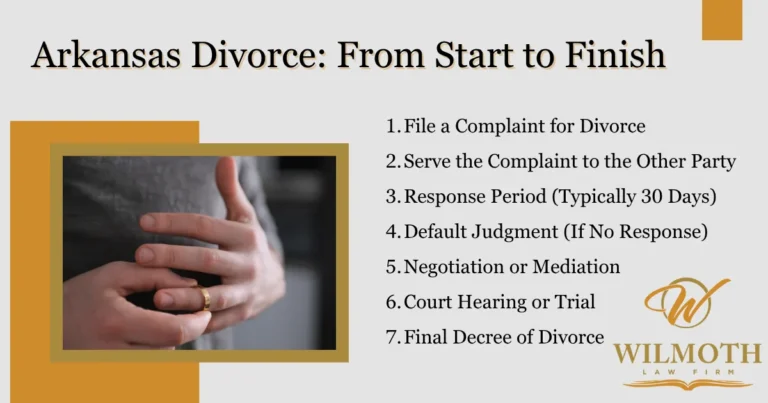Fayetteville Divorce Lawyers
Fayetteville Divorce Lawyers
Divorce can affect nearly every part of a person’s life, including family structure, finances, and emotional well-being. When legal proceedings begin, people face questions about property division, child custody, alimony, and court requirements. Decisions made during this period may have long-term consequences, so clear legal guidance is important.
Our Fayetteville divorce lawyers at Wilmoth Law Firm provide legal support for individuals who are dealing with divorce proceedings in Arkansas. With experience in local court procedures and state divorce statutes, we can prepare you for each stage of the legal process. We focus on key legal issues that impact short-term and long-term outcomes and provide personalized strategies and support.
What Are the Grounds for Divorce in Arkansas?
Arkansas recognizes both fault and no-fault grounds for divorce.
- No-Fault Divorce: You can seek a divorce on the basis of living separately without cohabitation for at least 18 continuous months. No proof of misconduct is required, but the separation period must be uninterrupted.
- Fault-Based Divorce: Arkansas law also allows divorce based on specific grounds such as adultery, cruelty, habitual drunkenness, felony conviction, impotence, or general indignities that make life intolerable. The spouse filing for divorce must provide evidence of the alleged misconduct.
Our Fayetteville divorce lawyers can assess which grounds may apply to your case and help you build the necessary documentation.
What Is the Process for Filing for Divorce?
To begin the divorce process in Arkansas, one spouse files a Complaint for Divorce in the circuit court of the county where either spouse resides. The filing must state the grounds for divorce and include information about children, property, and other relevant issues.
After filing, the other party must be served with the complaint and given an opportunity to respond. If they do not respond within the required timeframe—typically 30 days—the court may grant a default judgment.
Our Fayetteville divorce lawyers assist with every step, from filing the initial paperwork to representing your interests during hearings, negotiations, or trial, if necessary.

How Is Property Divided During Divorce?
Arkansas follows the principle of equitable distribution. This means the court seeks to divide marital property fairly, though not necessarily equally.
- Marital property includes most assets and debts acquired during the marriage.
- Separate property typically includes items owned prior to the marriage, personal gifts, or inheritances, unless they were commingled with marital property.
Courts consider factors like the length of the marriage, each spouse’s economic circumstances, and each party’s contributions to the household when determining an equitable division. Our Fayetteville divorce lawyers work to protect your financial interests through detailed asset review and negotiation.
What Are the Rules Concerning Child Custody and Visitation?
In Arkansas, child custody decisions are based on the best interests of the child. Courts generally prefer arrangements that allow children to maintain healthy relationships with both parents, unless doing so would endanger the child.
- Legal custody involves decision-making authority over the child’s education, healthcare, and general welfare.
- Physical custody refers to the child’s primary residence.
Judges consider each parent’s ability to provide a stable home, the child’s emotional needs, and any history of domestic violence. Visitation may be liberal or structured, depending on what is in the child’s best interests.
Our Fayetteville divorce lawyers help draft parenting plans that reflect your child’s needs and advocate for fair custody and visitation terms.
Is Spousal Support Available in Arkansas?
Yes. Alimony, also known as spousal support, may be awarded when one spouse is financially dependent and the other has the means to provide support. Courts in Arkansas consider several factors, such as:
- Length of the marriage
- Standard of living during the marriage
- Each party’s income and earning potential
- Age and health of both spouses
Spousal support may be temporary, rehabilitative, or permanent, depending on the circumstances. Our team works to ensure alimony decisions are fair and sustainable.
How Long Does a Divorce Take in Arkansas?
The duration of a divorce case depends on whether it is contested or uncontested. In uncontested divorces, where both parties agree on major issues, the process may take as little as 30 to 60 days after filing.
Contested divorces, which involve disputes over property, custody, or support, take longer, often several months or more, due to discovery, negotiations, and court hearings.
We aim to move your case forward efficiently while protecting your rights every step of the way.
Can Divorce Agreements Be Modified Later?
Yes. Certain aspects of a divorce order—especially those related to child custody, visitation, child support, and spousal support—can be modified if there is a substantial change in circumstances.
Examples include:
- Job loss or increase in income
- Relocation
- Changes in a child’s needs or schedule
To seek a modification, our Fayetteville divorce lawyers can file a motion with the court and present evidence supporting your request. Property division, however, is generally final and cannot be changed once the divorce is complete.
What Happens if One Party Does Not Follow the Court Order?
If a party violates a court order related to custody, support, or property division, the other party may file a motion for contempt. The court may then impose penalties such as:
- Fines
- Wage garnishment
- License suspension
- Even jail time in extreme cases
We help clients document violations and pursue appropriate enforcement actions to protect their rights.
Fayetteville Divorce Lawyers at Wilmoth Law Firm Offer Free Consultations
Whether your case involves property division, child custody, or spousal support, our lawyers will provide guidance rooted in a deep understanding of Arkansas law and local court practices. For a free consultation, call our Fayetteville, Arkansas, office at 479-443-8080 or complete our online form. We serve clients in the surrounding areas. Our Fayetteville divorce lawyers at Wilmoth Law Firm are ready to help you today!
Our Practice Areas
Workers’ Compensation
